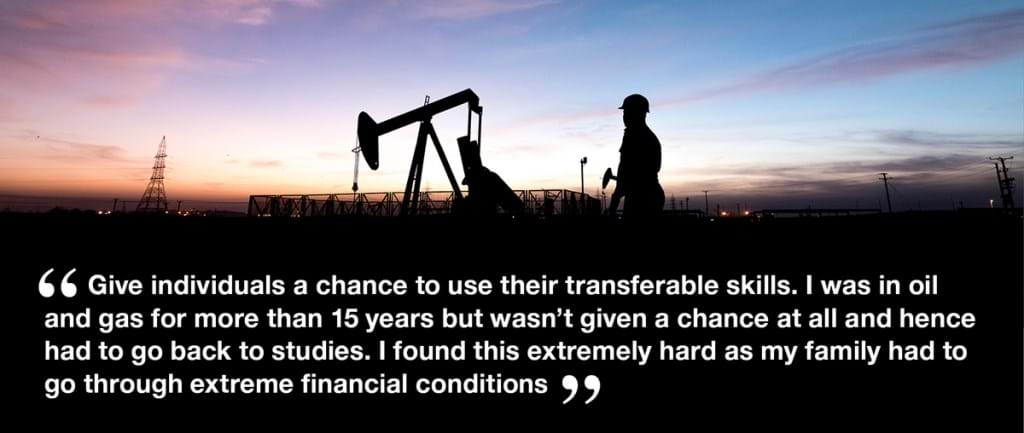Achieving a Just Transition and boosting skills for chemical engineers

5th November 2021
What is a just transition and how does it affect chemical engineers?
There are many definitions of a “just transition” online, all with a similar theme in equally supporting workers in high carbon intensive industries to move into new lines of work, and the communities and economies they serve.
The Chemical Engineer looks at this in depth in two recent feature articles. In the first, reporter Amanda Doyle explains what the energy transition is and why it must be fair for workers in high carbon industries, while the second article analyses a survey of oil and gas workers, revealing how the energy transition affects them and what they feel could be done to support them.
Challenges and opportunities
The Chemical Engineer’s feature article, Achieving a Just Transition, defines a just transition as where highly skilled people in heavy carbon industries are retrained for greener industries rather than being made redundant, while also ensuring that communities aren’t left devastated by the closure of facilities.
Citing various reports from engineering institutions, governments, professionals and bodies in the energy sector, the feature looks at the challenges of achieving a just transition and the differences on a global scale. This includes the difficulties faced by employees “as qualifications do not guarantee a job”, that training may not be financially viable for people trying to support families, and salaries in other energy sectors such as hydrogen might not be comparable to the likes of oil and gas.

While it is acknowledged the principle of a just transition is the same worldwide, the approach will differ - there is no “one-size-fits-all”, she states. Some countries and regions are more heavily dependent on jobs in fossil fuel industries, and developing countries may lack the funding required to transition to sustainable productions and economies.
“There is the potential for both short-term and long-term disruption if the transition is not managed correctly,” Doyle states.
Referring to the effects on the workers and communities on the job losses to the coal mining communities in northern England in the 1980s and the closure of the coal-fired Hazelwood Power Station in Australia in 2017 with only a few months’ notice, she determines: “An abrupt transition will lead to “stranded workers” and “stranded communities” as well as “stranded assets”. It is therefore imperative to involve both workers and the communities in decisions, as this is seen as key to obtaining public support in regions with high levels of employment in carbon-intensive sectors.”
Our survey says...
To follow this article, Doyle shares the findings of a survey completed anonymously by 196 members of IChemE's Oil and Natural Gas Special Interest Group (SONG) in Oil and Gas Workers Have Their Say on the Just Transition. The respondents work within a range of areas, in different countries around the world, and have differing membership grades, with the larger portions of respondents working in upstream oil and gas processing, located in the UK, and are Chartered Members.
Published in the November issue, this feature article comes as world leaders gather in Glasgow, UK for the 26th UN Climate Change Conference of the Parties (COP26) to discuss accelerating their goals in reducing global emissions, and protecting communities and natural habitats. IChemE is playing a key role in sharing what members are doing to mitigate and address the adverse impact of climate change, as well as committing to reduce our own operational carbon footprint. But as a learned society we must challenge the world and ask: what can and should be done to protect, upskill and reskill workers in carbon-heavy industries at the same time?
The Chemical Engineer’s survey found 28 people (14%) had recently lost their jobs or are being made redundant. Of those, 24 were not offered opportunities to retrain or move to another sector.

The article discusses further quantitative as well as qualitative data from the respondents, offering interesting insights as to how this group of IChemE members view a just energy transition could be achieved and the perceived barriers to securing work in other sectors. Predominantly the respondents want more training (for those further along their career, as well as those at the start of their career), better government policies, and for employers to appreciate the skillsets of current workers and support them with identifying transferable skills for new opportunities.
“It was suggested that if redundancies must happen, then employee upskilling should be mandated as part of that,” states Doyle. “On training, participants said that there needs to be competency mapping between industries, and that existing skill sets should be examined to see what’s transferrable, and where training would be required. It was also noted that more needs to be done to showcase what jobs are available and in what disciplines.”
The article also provides differing opinions on whether oil and gas workers should be given priority when transitioning into other sectors and what public and recruiter perceptions are to those currently working in, and wishing to switch from, heavy carbon intensive industries.
Furthermore, the survey respondents call not only for employers and government to do more to support workers during the energy transition, but IChemE too.
What is IChemE doing to help skills transition?
To support anyone considering transitioning between sectors and to give insight into the broad range of careers available, IChemE has developed a suite of careers resources hosted at www.icheme.org/career.
This includes links to current job opportunities, monthly Industry Insight webinars where members from different UK regions share their career experiences, tips and guidance, and features by The Chemical Engineer profiling engineers working outside the fossil-fuel based sectors; advice on switching sectors; and a profile of opportunities in battery production. The resource suite also includes a video series featuring chemical engineers - from graduate engineers through to senior executives - across a range of sectors sharing their career journeys and providing practical tips to those looking for new roles.
We also held a new virtual careers fair from 20–21 October. It saw 500 people register to gain insights from practicing chemical engineers across a range of sectors - including nuclear regulation, automation and process systems, risk management, and hygiene and infection prevention - and find out about current job opportunities. Recordings of all the sessions are available on our website.
Plus, IChemE is developing further training opportunities specifically in sustainable production through its Sustainability Hub, launching in February 2022. Members will have free access to a suite of new online, on-demand sustainability training courses throughout the year. This and the feedback from our recent member engagement survey also provided useful insight on member development needs and will help impact our future continuing professional development (CPD) offerings.
Read The Chemical Engineer’s articles Achieving a Just Transition and Oil and Gas Workers Have Their Say on the Just Transition in full now to find out all the fascinating insights.